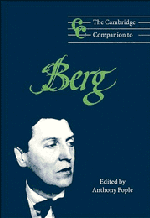2 - Battles of the mind: Berg and the cultural politics of ‘Vienna 1900’
from Part 1 - Culture and environment
Published online by Cambridge University Press: 28 September 2011
Summary
On the evening of 31 March 1913 the Great Hall of the Vienna Musikverein erupted as Arnold Schoenberg conducted two of Berg's songs Op. 4, the Fünf Orchesterlieder nach Ansichtskartentexten von Peter Altenberg. The audience bawled for composer and poet to be sent to the madhouse, knowing full well that Altenberg was already a patient in the State Mental Institution at Steinhof on the outskirts of the city. Fights broke out, the police were called, and Erhard Buschbeck, a friend of Berg's and an organiser of the concert, was arrested after trading blows with the operetta composer Oscar Straus. At the trial Straus remarked that the thud of the punch had been the most harmonious thing in the whole concert.
Although the Skandalkonzert has entered the folklore of modern musical history, it is perhaps not fully appreciated just how symbolic this event was, nor how indicative (albeit in a fairly extreme form) of cultural life in the city as a whole. For the glorious cultural florescence of ‘Vienna 1900’ – now almost as clichéd as is the other Vienna of Johann Strauss and Sachertorte – was riven with factions, spite and, on occasions, violence. As often as not, the aggression focused on a man revered by Alban Berg: the satirist Karl Kraus (1874–1936), a close friend of Altenberg and no stranger to non-verbal altercation. As early as 1897 fists replaced brains when Felix Salten, author of Bambi, boxed the satirist's ears for suggesting that the Budapest-born Salten's command of German grammar was less than perfect.
- Type
- Chapter
- Information
- The Cambridge Companion to Berg , pp. 24 - 37Publisher: Cambridge University PressPrint publication year: 1997
- 2
- Cited by

